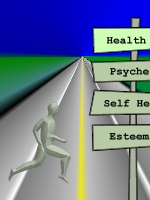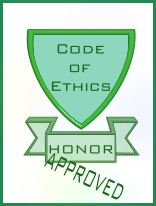Apply your focus
& intent to create
optimal wellness
& health.
• Sitemap
• Articles
• Headlines
• Coaching
• Shoppe
• Resources
• Trophies
• Win Awards
• Dialogue
• Courses
• Subscribe
• About Us
• Disclaimer
• Privacy
• Art Meditation
• Contact Us
• Main
|
The Internet Self-Help Trail : Prepare for Travel! by June
Kaminski, MSN
The Internet has grown to be a perfect vehicle for self-help information
tools. There's a lot out there. So, how do you choose reliable, safe
information? It's important to learn to judge the quality of the content you
read. To keep yourself both safe and informed.
Experts in all fields of psychology, health, and other fields open to
self-help initiatives are both thrilled and concerned about the wealth of
information available online. Thrilled, because the Internet gives an unique way
to serve people, in their own homes, and when they need it. Concerned, because
there are both reputable and unreliable sources out there. How to choose?
Is This Expert Advice?
Sites like Healing Intent offer advice from experts. Most are offered by
health care professional who have reliable credentials and know how to work with
people effectively in this new medium. This is a key point when choosing the
advice you follow. Whenever you consider using a site, ask yourself:

- Are the authors and therapists experts in their fields?
- Is the advice given based on sound theory and principles?
- Is it easy to find their credentials? Are they clearly visible?
- If a site is offered by lay people, is this clearly stated? (Many support
groups are not run by experts but may be helpful for sharing common
experiences. Be careful though if you follow advice.)
- Is confidentiality addressed?
- Do they address ethical issues?
- What legal issues are addressed?
- Are references and sources easy to find?
- Is a disclaimer easily found if the author is not an expert?
Making Your Choice
When you first enter a self-help site, give it a good once over. Look at the
quality of the layout, design and content. Does it appear to be professionally
designed? This is one indication that a bona fide organization is running the
show. But it is only the beginning. Anyone can hire a web designer to make a
killer looking site. Look further for the founders. Are they experts? An
organization? Can you easily find their credentials, or do you have to search
high and low for them?
Once you have made a choice, your own discernment is still your best guide.
If services, products, therapy, even advice are taken with ill effect there are
ways to complain about it. But, in the long run little recourse may be available
without some sort of legal intervention. (1).
Code of Ethics and Honor
 Organizations are springing up to address the issue of ethics in self-help and
health related web sites. The HON or Health on the Net Foundation is one such
group. They claim that all sites that show their logo are reputable and follow
their Code of Conduct. The first code states, "Any medical or health advice
provided and hosted on this site will only be given by medically trained and
qualified professionals unless a clear statement is made that a piece of advice
offered is from a non-medically qualified individual or organization". (2).
Organizations are springing up to address the issue of ethics in self-help and
health related web sites. The HON or Health on the Net Foundation is one such
group. They claim that all sites that show their logo are reputable and follow
their Code of Conduct. The first code states, "Any medical or health advice
provided and hosted on this site will only be given by medically trained and
qualified professionals unless a clear statement is made that a piece of advice
offered is from a non-medically qualified individual or organization". (2).
It's important to use your discernment when following any self-help advice.
You need to make sure your privacy is protected and that your "therapist" is
genuine. If you feel unsure, check it out with someone in the know. And don't be
afraid to seek a second opinion. Online self help requires self responsibility
and protection. Keep yourself safe as you explore sites geared for personal
growth and health. If you don't, who will?
References
Loundy, D. Internet Governance through self-help remedies.
http://www.loundy.com/CPSR-Self-Help.html
Health on the Net Foundation (HON).
http://www.hon.ch/
Resources
Metanoia's Internet
Therapy Guide offers sensible advice to using online self-help and
therapist resources.
Best Practices in
e-Therapy by Dr. John Grohol answers questions about the pros and cons
of online therapy.
Site is optimized for all browsers - for screen resolution 800x600 - for 16 bit or better color.
© June Kaminski, MSN - 2001 - 2005 -Healing Intent.com - All rights reserved.
Design by June Kaminski, Visions of Adonai Design
|
|

